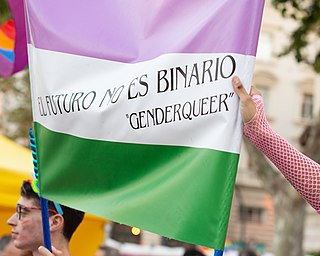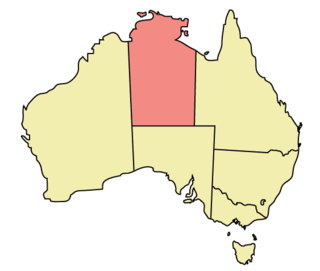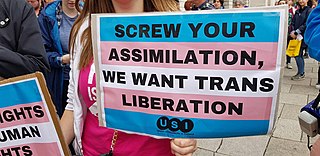Related Research Articles
Heteronormativity is the concept that heterosexuality is the preferred or normal sexual orientation. It assumes the gender binary and that sexual and marital relations are most fitting between people of opposite sex.

Non-binary and genderqueer are umbrella terms for gender identities that are not solely male or female. Non-binary identities often fall under the transgender umbrella since non-binary people typically identify with a gender that is different from the sex assigned to them at birth, though some non-binary people do not consider themselves transgender.
The following outline is provided as an overview of and topical guide to transgender topics.

Lesbian, gay, bisexual, and transgender (LGBT) rights in India have expanded in the 21st century, though much of India's advancements on LGBT rights have come from the judiciary and not the legislature. Indian LGBT citizens still face social and legal difficulties not experienced by non-LGBT people.

Lesbian, gay, bisexual, and transgender (LGBT) rights in Nepal have expanded in the 21st century, though much of Nepal's advancements on LGBT rights have come from the judiciary and not the legislature. Same-sex sexual activity was decriminalized in 2007. On 28 June 2023, a single judge bench of Justice Til Prasad Shrestha issued a historic interim order directing the government to make necessary arrangements to "temporarily register" the marriages of "non-traditional couples and sexual minorities". The full bench of the Supreme Court has yet to deliver a final verdict. The first "same-sex" marriage of a trans woman and a cisgender man occurred in November 2023. Nepal will be the first least developed country to legalize same-sex marriage, and the second jurisdiction in Asia after Taiwan.

Lesbian, gay, bisexual and transgender (LGBT) rights in Tamil Nadu are the most progressive among all states of India. Tamil Nadu was the first state in India to introduce a transgender welfare policy, wherein transgender individuals can access free gender affirmation surgery in government hospitals and various other benefits and rights. The state was also the first to ban forced sex-selective surgeries on intersex infants, and also the first state to include an amendment in its state police guidelines that expects officers to abstain from harassing the LGBTQIA+ community and its members. The state also became the first to ban conversion therapy as well as the first to introduce LGBTQIA+ issues in school curricula.
Discrimination against non-binary people, people who do not identify exclusively as male or female, may occur in social, legal, or medical contexts.

Lesbian, gay, bisexual, and transgender (LGBT) people in Australia's Northern Territory have the same legal rights as non-LGBT people. The liberalisation of the rights of lesbian, gay, bisexual and transgender (LGBT) people in Australia's Northern Territory has been a gradual process. Homosexual activity was legalised in 1983, with an equal age of consent since 2003. Same-sex couples are recognised as de facto relationships. There was no local civil union or domestic partnership registration scheme before the introduction of nationwide same-sex marriage in December 2017, following the passage of the Marriage Amendment Act 2017 by the Australian Parliament. The 2017 Australian Marriage Law Postal Survey, designed to gauge public support for same-sex marriage in Australia, returned a 60.6% "Yes" response in the territory. LGBT people are protected from discrimination by both territory and federal law, though the territory's hate crime law does not cover sexual orientation or gender identity. The territory was the last jurisdiction in Australia to legally allow same-sex couples to adopt children.

National Legal Services Authority v. Union of India(2014) is a landmark judgement of the Supreme Court of India, which declared transgender people the 'third gender', affirmed that the fundamental rights granted under the Constitution of India will be equally applicable to them, and gave them the right to self-identification of their gender as male, female or third gender.

The following outline offers an overview and guide to LGBT topics.

Lesbian, gay, bisexual and transgender (LGBT) people in Kerala face legal and social difficulties not experienced by non-LGBT persons. However, Kerala has been at the forefront of LGBT issues in India after Tamil Nadu. It became one of the first states in India to establish a welfare policy for the transgender community and in 2016, proposed implementing free gender affirmation surgery through government hospitals. Same-sex sexual activity has been legal since 2018, following the Supreme Court ruling in Navtej Singh Johar v. Union of India. In addition, numerous LGBT-related events have been held across Kerala, including in Kochi and Thiruvananthapuram. However, there is also increasing opposition to LGBT rights recently as evidenced by the anti-LGBT campaigns spearheaded by meninist groups and Muslim organisations like Indian Union Muslim League, Samastha and Jamaat-e-Islami.

Transgender and non-binary people in New Zealand face discrimination in several aspects of their lives. The law is unclear on the legal status of discrimination based on gender identity, and also for intersex people.

Multiple countries legally recognize non-binary or third gender classifications. These classifications are typically based on a person's gender identity. In some countries, such classifications may only be available to intersex people, born with sex characteristics that "do not fit the typical definitions for male or female bodies."

A citizen of Ireland is legally permitted to change the designation of their gender on government documents through self-determination. In 2015, Ireland was the fourth state in the world to permit such alterations to government documents. By May 2017, 230 people had been granted gender recognition certificates under the law. Section 16 of the Act entitles the holder of a gender recognition certificate to apply to have the certificate amended if there is a clerical error or an error of fact in the content of the certificate. Two such corrections have been made since commencement of the Act.

The health access and health vulnerabilities experienced by the lesbian, gay, bisexual, transgender, queer or questioning, intersex, asexual (LGBTQIA) community in South Korea are influenced by the state's continuous failure to pass anti-discrimination laws that prohibit discrimination based on sexual orientation and gender identity. The construction and reinforcement of the South Korean national subject, "kungmin," and the basis of Confucianism and Christian churches perpetuates heteronormativity, homophobia, discrimination, and harassment towards the LGBTQI community. The minority stress model can be used to explain the consequences of daily social stressors, like prejudice and discrimination, that sexual minorities face that result in a hostile social environment. Exposure to a hostile environment can lead to health disparities within the LGBTQI community, like higher rates of depression, suicide, suicide ideation, and health risk behavior. Korean public opinion and acceptance of the LGBTQI community have improved over the past two decades, but change has been slow, considering the increased opposition from Christian activist groups. In South Korea, obstacles to LGBTQI healthcare are characterized by discrimination, a lack of medical professionals and medical facilities trained to care for LGBTQI individuals, a lack of legal protection and regulation from governmental entities, and the lack of medical care coverage to provide for the health care needs of LGBTQI individuals. The presence of Korean LGBTQI organizations is a response to the lack of access to healthcare and human rights protection in South Korea. It is also important to note that research that focuses on Korean LGBTQI health access and vulnerabilities is limited in quantity and quality as pushback from the public and government continues.

S Sushma &Anr. versus Commissioner of Police&Ors.(2021) is a landmark decision of the Madras High Court that prohibited practice of "conversion therapy" by medical professionals in India. The court directed comprehensive measures to sensitize the society and various branches of the Union and State governments to remove prejudices against the queer community.
Vyjayanti Vasanta Mogli is an Indian transgender activist, RTI activist, singer and motivational speaker. She intervened in the “Suresh Kumar Kaushal & Other vs Naz Foundation & Others” case in the Supreme Court in 2014 in which she highlighted the deleterious effects of conversion or reparative therapy on queer people through her affidavit.

Legal gender, or legal sex, is a sex or gender that is recognized under the law. Biological sex, sex reassignment and gender identity are used to determine legal gender. The details vary by jurisdiction. Legal gender identity is fundamental to many legal rights and obligations, including access to healthcare, work, and family relationships, as well as issues of personal identification and documentation. The complexities involved in determining legal gender, despite the seeming simplicity of the underlying principles, highlight the dynamic interaction between biological characteristics, self-identified gender identity, societal norms, and changing legal standards. Because of this, the study of legal gender is a complex field that is influenced by cultural, historical, and legal factors. As such, a thorough investigation is necessary to fully understand the subject's implications and breadth within a range of legal systems and societies.

Arun Kumar &Anr. versus Inspector General of Registration&Ors. (2019) is a decision of the Madras High Court which recognised trans woman as a "bride" within the meaning of the Hindu Marriage Act 1955 and prohibited genital-normalizing surgery for intersex infants and children except on life-threatening situations.

Karnataka Sexual Minorities Forum versus State of Karnataka &Ors. (2017), a case of the Karnataka High Court, which resulted in an amendment of Section 36A of the Karnataka Police Act, which categorized the intersex, non-binary gender and transgender individuals as predisposed to criminal activity.
References
- 1 2 3 4 "Hits and misses of Telangana High Court's Order striking down the 'Eunuch' Act – The Leaflet". theleaflet.in. 2023-07-15. Retrieved 2023-08-27.
- 1 2 3 Sasikumar, Meenakshy (2023-07-10). "Telangana High Court Scraps 'Unconstitutional' Eunuchs Act: Here's Why It Needed To Go". TheQuint. Retrieved 2023-08-27.
- 1 2 3 4 5 6 7 8 9 10 11 12 13 14 15 16 17 18 19 20 21 Vyjayanti Vasanta Mogli v. State of Telangana, Writ Petition (Public Interest Litigation) No. 44 of 2018 ( Telangana High Court 6 July 2023).
- 1 2 Hinchy, Jessica Bridgette (2 July 2019). "The long history of criminalising Hijras". Himal Southasian. Archived from the original on 9 July 2019.
- 1 2 3 Kothari, Jayna (2019). "Section 377 and Beyond: A New Era for Transgender Equality?" (PDF). In Meinardus, Ronald (ed.). How liberal is India? the quest for freedom in the biggest democracy on earth. New Delhi: Academic Foundation. ISBN 978-93-327-0507-4. Archived from the original on 2021-07-27. Retrieved 2023-08-27.
{{cite book}}: CS1 maint: bot: original URL status unknown (link) - 1 2 3 "Vyjayanti Vasanta Mogli & Ors. v. State of Telangana". Centre for Law & Policy Research. Retrieved 2023-08-27.
- ↑ Telangana Eunuchs Act of 1329 Fasli (PDF). Telangana Legislature. 1919.
- ↑ "Vyjayanti Vasanta Mogli v. State of Telangana & Ors". Centre for Law & Policy Research. Retrieved 2023-08-28.
- 1 2 3 Vyjayanti Vasanta Mogli v. State of Telangana, Writ Petition (Public Interest Litigation) No. 74 of 2020 ( Telangana High Court 27 April 2020).
- 1 2 Vyjayanti Vasanta Mogli v. State of Telangana, Writ Petition (Public Interest Litigation) No. 74 of 2020 ( Telangana High Court 29 June 2020).